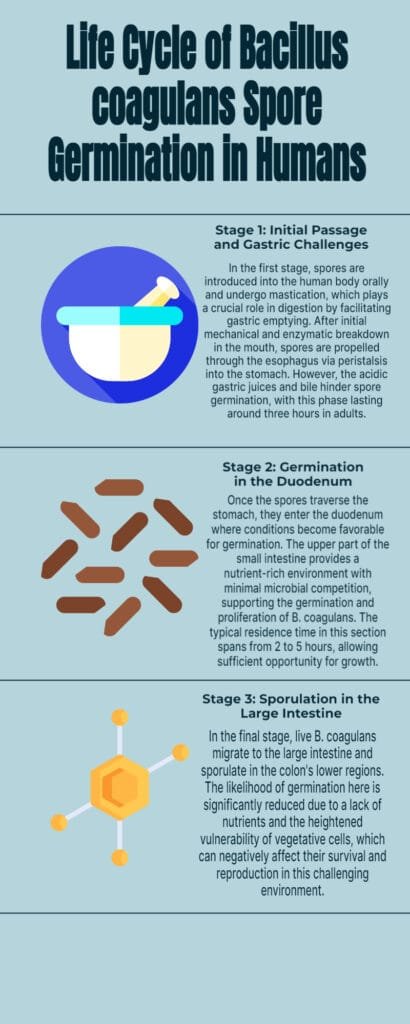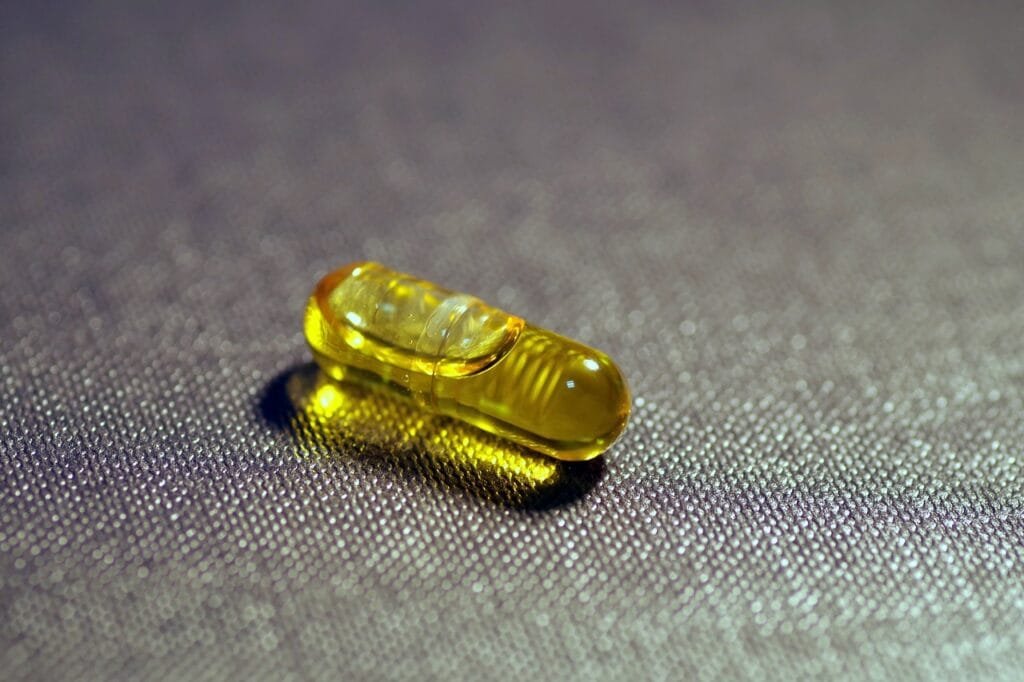Bacillus coagulans: A highly resistant and versatile spore-forming probiotic
According to the World Health Organization, probiotics are live microorganisms that confer a health benefit on the host when administered in adequate amounts. These supplements are generally safe and considered fundamental for gastrointestinal health. However, in recent years, they have been the focus of research, and even some scientific journals are devoted to studying them in detail.
Most studies in the past focused on probiotic microorganisms and their effects on gastrointestinal conditions. However, recent developments show their applications beyond gut health, including immune modulation and neurotransmitter changes in their mechanisms of action.
Researchers constantly worry that most probiotics have a very low tolerance for harsh environments. Lactobacilli are excellent probiotics but have low survival rates, around 1-15%. You need a high load of bacteria to compensate for the ones lost on their way to your gut (1). That’s why Bacillus coagulans make a difference in probiotic supplements and attract the interest of new researchers.
After reading this article, you will learn that this species is particularly resistant and has a higher survival rate than other probiotics. Moreover, it has many health applications besides relieving diarrhea and gastrointestinal conditions.
Bacillus coagulans has been extensively studied in toxicological experiments and clinical observations, which have consistently demonstrated its safety. It has been found to have no mutagenic, teratogenic, or genotoxic effects. This makes Bacillus coagulans a highly resistant and versatile spore-forming probiotic that can be confidently recommended for use.
What everyone should know about Bacillus coagulans
We may refer to Bacillus coagulans as B. coagulans for short. The bacteria was first discovered in 1915 under the microscope on spoiled canned milk. It is a lactic acid-producing bacteria, so it was initially labeled under the genus Lactobacillus but then reclassified within the genus Bacillus.
You have probably heard about the Bacillus genus before, but not for the right reasons. One member of this genus is Bacillus anthracis, the bacteria that causes anthrax. However, other species in the family are far from pathogenic or dangerous. Quite the opposite. B. coagulans is a beneficial probiotic that shares a few structural and metabolic traits with its cousins but not the disease-causing potential.
Another particular trait of this bacteria is its spore-forming capability. Spores are highly resistant, dormant forms of bacteria that survive extreme conditions by coating themselves with a protective structure. They can remain dormant for years and return to their active bacterial form.
B. coagulans’ ability to form spores allows the bacteria to survive longer in supplement form and pass through the gastrointestinal tract unchanged until reaching the gut. It survives the stomach environment and germinates in the intestines to exert its probiotic effect. The only problem is that B. coagulans does not stay in the gut for very long, and frequent supplement intake is necessary to maintain its health benefits (2).
Benefits and health applications of B. coagulans
In humans, C. coagulans’ life cycle is divided into three stages. In stage one, bacteria spores enter the body orally and pass through the stomach. They survive mastication, gastric acid, and enzymatic degradation. After that, they pass through the small intestines and survive bile, which delays germination.
Stage 2 starts after three hours of ingestion when the bacteria are still in the upper part of the small intestine. The bacteria stay in the small intestines for 2 to 5 hours until they reach the large intestine and start stage 3. During this stage, the bacteria still exert their effect in the body before sporulating in the lower part of the colon.
Throughout this process, B. coagulans triggers metabolic changes with various effects in the human body, as follows:
B. coagulans increase gut nutrient absorption and availability
Once it germinates in the small intestines, B. coagulans start producing a variety of enzymes that aid digestion. One of the most important is beta-galactosidase, which aids in the digestion of lactose. As such, B. coagulans can be used to improve digestibility of milk and relieve symptoms of lactose intolerance (3).
However, besides contributing to lactose breakdown, some strains of B. coagulans can also promote the digestion of protein and carbohydrates. The enzymes produced by the bacteria add up to the effect of digestive enzymes produced by the gut. They degrade food products into smaller peptide molecules and free amino acids. The effect has been proven in athletes, who experienced better amino acid absorption after consuming them with B. coagulans supplements (4).
B. coagulans can regulate intestinal transit
Similar to other probiotics. B. coagulans can regulate gut microbiota and reduce the risk of infection by pathogenic bacteria. Similar to Lactobacilli, it is a lactic acid-producing bacteria. As such, it creates a slightly acidic environment by producing this substance. In this environment, some disease-causing bacteria can’t thrive and won’t cause diarrhea and other symptoms. In the presence of B. coagulans, beneficial bacteria such as Lactobacillus and Bifidobacteria increase while decreasing the effect of pathogenic bacteria such as Clostridium difficile, enterococci, and pathogenic Escherichia coli (5,6).
However, in addition to relieving and preventing diarrhea, B. coagulans can also increase intestinal transit when stuck. The byproducts of this bacteria stimulate peristalsis, the movements that drive food forward through the digestive tract. Studies show that administering B. coagulans may relieve constipation and ameliorate the sensation of fecal retention. It improves bowel movement frequency and may even reduce ammonia levels in the intestines, which may also improve fecal odor (7,8).
B. coagulans can provide relief to inflammatory bowel disease symptoms
Inflammatory bowel disease comprises Crohn’s disease, ulcerative colitis, and a third type that combines symptoms of both. These chronic inflammatory conditions of the large intestines are characterized by abdominal pain, flatulence, and bloating. As the name implies, inflammatory bowel disease is triggered by inflammatory cytokines and infectious agents, and many probiotics with anti-inflammatory potential, including B. coagulans, can relieve the symptoms.
It is not entirely known why B. coagulants help these patients. However, many clinical trials show significant improvements after consuming the probiotic. As a result, researchers often recommend using this probiotic to improve patients’ quality of life with IBS. Most patients in clinical trials are adults and the elderly, but one study has also shown promising results in children (9).
B. coagulans may improve metabolic disease in people who are overweight or have high cholesterol
Metabolic disease represents a global epidemic health problem with complex solutions that often require profound lifestyle changes. Some drugs and supplements can help as long as they are accompanied by healthy habits. According to studies, B. coagulans can be included in the therapeutic arsenal for metabolic diseases, especially regarding high cholesterol and overweight.
Studies show that B. coagulans can reduce triglyceride levels, cholesterol, and atherogenic lipoproteins. It may even help reduce body weight in some cases, but this effect has not been evaluated in human subjects. However, in one study, patients receiving the supplement had better clinical outcomes after underground laparoscopic sleeve gastrectomy bariatric surgery to facilitate weight loss (10, 11).
B. coagulans can relieve depressive symptoms in selected cases
There are many causes of depression, and some result from a combination of metabolic byproducts and chronic disease symptoms. For example, in patients with irritable bowel disease, the ailment can be by itself a cause of depression. However it is further aggravated by myeloperoxidase, an inflammatory biomarker in these patients. In other words, patients with irritable bowel syndrome often suffer from depression due to their chronic symptoms and substances that interfere with normal brain function.
In this context, B. coagulans can help these patients in two different ways. It helps reduce inflammation and the severity of IBS symptoms. But it also lowers myeloperoxidase levels in the blood. By doing so, inflammatory cytokines stop affecting brain function and won’t trigger depressive symptoms (12).
B. coagulans modulate the immune system and helps patients with rheumatoid arthritis
Another common feature of probiotics is how they modulate the immune system. A wide network of immune tissue is linked to the gut, known as Gut-Associated Lymphoid Tissue, or GALT. This association communicates with the outside world to train our immune system via the digestive system. That’s why our gut microbiota has much to do with how the immune system behaves.
B. coagulans have a role in infectious diseases and immunity in general. However, we should highlight its application to rheumatoid arthritis. According to studies in patients with this disease, B. coagulans shows promising effects as a therapeutic adjuvant to treat this autoimmune disorder. It regulates proinflammatory cytokines and reduces inflammation, alleviating rheumatoid arthritis symptoms (13, 14).
B. coagulans can help recover from high-intensity endurance training
Another recently discovered application is associated with athlete recovery from exercise. At least two clinical studies recommend B. coagulans to reduce exercise-induced muscle damage and inflammation triggered by high-intensity military training.
B. coagulans reduce the cytokine response from training heavily in military camps. When combined with other supplements, such as beta-hydroxy-beta-methyl butyrate calcium (CaHMB), the results are even better and preserve muscle integrity in these athletes (15,16)
Key takeaways from consuming B. coagulans
B. coagulans is a versatile and resilient probiotic with many health benefits. It is a spore-forming probiotic that survives harsh environments in the gastrointestinal tract and reaches the intestines almost intact, exerting benefits beyond gut health.
This probiotic can improve digestion and facilitate the enzymatic breakdown of nutrients. It also relieves gastrointestinal problems triggered by pathogenic bacteria while enhancing the survival and colonization of beneficial bacteria. Thus, it helps reduce the severity of diarrhea and may even promote peristalsis in cases of constipation. It also relieves chronic inflammation in rheumatoid arthritis and inflammatory bowel disease. Other potential applications include improving depressive symptoms in selected patients and its application to facilitate recovery and reduce muscle breakdown after high-intensity physical training.
Remember that supplementation with B. coagulans should be consistent because the probiotic does not colonize and stays in the gut for very long. Still, it is a powerful tool to enhance overall health in both clinical settings and everyday health practices.
References:
Keller, D., Verbruggen, S., Cash, H., Farmer, S., & Venema, K. (2019). Spores of Bacillus coagulans GBI-30, 6086 show high germination, survival and enzyme activity in a dynamic, computer-controlled in vitro model of the gastrointestinal tract. Beneficial microbes, 10(1), 77-87.
Abhari, K. H., Shekarforoush, S. S., Sajedianfard, J., Hosseinzadeh, S., & Nazifi, S. (2015). The effects of probiotic, prebiotic and synbiotic diets containing Bacillus coagulans and inulin on rat intestinal microbiota. Iranian journal of veterinary research, 16(3), 267.
Batra, N., Singh, J., Banerjee, U. C., Patnaik, P. R., & Sobti, R. C. (2002). Production and characterization of a thermostable β‐galactosidase from Bacillus coagulans RCS3. Biotechnology and applied biochemistry, 36(1), 1-6.
Jäger, R., Purpura, M., Farmer, S., Cash, H. A., & Keller, D. (2018). Probiotic Bacillus coagulans GBI-30, 6086 improves protein absorption and utilization. Probiotics and antimicrobial proteins, 10(4), 611-615.
Ara, K., Meguro, S., Hase, T., Tokimitsu, I., Otsuji, K., Kawai, S., … & Iino, H. (2002). Effect of spore-bearing lactic acid-forming bacteria (Bacillus coagulans SANK 70258) administration on the intestinal environment, defecation frequency, fecal characteristics and dermal characteristics in humans and rats. Microbial Ecology in Health and Disease, 14(1), 4-13.
Ara, K., Meguro, S., Hase, T., Tokimitsu, I., Otsuji, K., Kawai, S., … & Iino, H. (2002). Effect of spore-bearing lactic acid-forming bacteria (Bacillus coagulans SANK 70258) administration on the intestinal environment, defecation frequency, fecal characteristics and dermal characteristics in humans and rats. Microbial Ecology in Health and Disease, 14(1), 4-13.
Aminlari, L., Shekarforoush, S. S., Hosseinzadeh, S., Nazifi, S., Sajedianfard, J., & Eskandari, M. H. (2019). Effect of probiotics Bacillus coagulans and Lactobacillus plantarum on lipid profile and feces bacteria of rats fed cholesterol-enriched diet. Probiotics and antimicrobial proteins, 11, 1163-1171.
Kazzi, F., Daher, N., Zimmerman, G., Garcia, M., Schmidt, N., & Scharf, K. (2021). Effect of Bacillius coagulans and galactomannans on obese patients undergoing sleeve gastrectomy, a randomized-controlled clinical trial. Alternative Therapies in Health & Medicine, 27.
Majeed, M., Nagabhushanam, K., Arumugam, S., Majeed, S., & Ali, F. (2018). Bacillus coagulans MTCC 5856 for the management of major depression with irritable bowel syndrome: a randomised, double-blind, placebo controlled, multi-centre, pilot clinical study. Food & nutrition research, 62.
Ambatipudi, K., & Deane, E. M. (2008). In search of neutrophil granule proteins of the tammar wallaby (Macropus eugenii). Molecular immunology, 45(3), 690-700.
Smolen, J. S., & Steiner, G. (2003). Therapeutic strategies for rheumatoid arthritis. Nature reviews Drug discovery, 2(6), 473-488.
Jäger, R., Shields, K. A., Lowery, R. P., De Souza, E. O., Partl, J. M., Hollmer, C., … & Wilson, J. M. (2016). Probiotic Bacillus coagulans GBI-30, 6086 reduces exercise-induced muscle damage and increases recovery. PeerJ, 4, e2276.
Gepner, Y., Hoffman, J. R., Shemesh, E., Stout, J. R., Church, D. D., Varanoske, A. N., … & Ostfeld, I. (2017). Combined effect of Bacillus coagulans GBI-30, 6086 and HMB supplementation on muscle integrity and cytokine response during intense military training. Journal of Applied Physiology, 123(1), 11-18.





